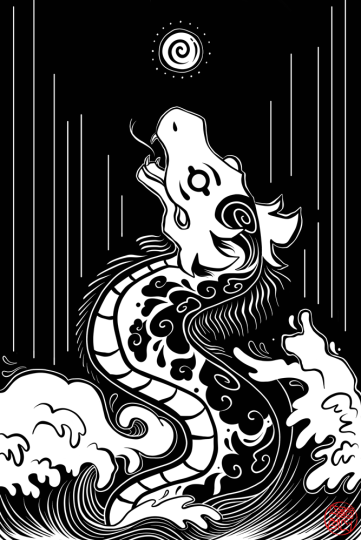For some reason, the stories I select for this project and its predecessors tend towards the bleak, what with the death and the dying and elevated IQ dissolving away and planets cast into the outer darkness. It is the beginning of a new year, however, and I think it’s best to start on a high note so we can better appreciate how what a disappointing trashfire 2019 ends up being. This calls for a particularly fine, especially optimistic piece.
Malaysian born Zen Cho resides in what is presently the UK. Although comparatively new to speculative fiction, she has already won a British Fantasy Award (for best newcomer). Works published thus far include her debut novel Sorcerer to the Crown, Spirits Abroad, The Terracotta Bride, as well as others. She is also active as an editor, as demonstrated by the anthology Cyberpunk Malaysia. Her enchanting If at First You Don’t Succeed, Try, Try Again (available here) seemed the perfect work to get 2019 off to the right start. But will my readers agree?
I think this one was my favorite of all the ones we’ve read so far. Byam shows great patience and devotion to their task, despite being perhaps just a tad clueless on occasion, and their focus on “revenge” turns out to be as endearingly clueless as their earnest-yet-not-quite-right attempts to become a dragon.
Leslie is just sweet, and the way in which she — quite naturally — changes Byam from angry to interested to affectionate to lover is really well done. Their relationship — and how it seems to hinge on Leslie understanding more than the three thousand year old Byam — is developed very nicely, despite the limited space able to be devoted to it.
And, of course, Byam’s final rebirth is a fine capstone, with the young imugi’s cluelessness replaced by understanding of life, so that they can be a very fine Dragon indeed — one with a consideration for even the silly humans on the world below.
—Ryk
A very fun story. I read it a while ago, and then I skimmed it again before writing this, and wound up re-reading it more closely than I expected to, which is a testament to Cho’s ability to write an entertaining story. I’ve read her collection Spirits Abroad, which is mostly set in Indonesia; Korea is a little ways away from there. I’m not familiar with the imugi, so I can’t say for sure how faithful Cho was to original sources, but the portrayal here certainly felt authentic – although skewed to a modern perspective; I doubt the original sources have humans shouting, “Fuck you, imugi!”. But I don’t see anything wrong with that.
The introductory portion of the story felt a little long. On the other hand, it’s hard to see how it could be shortened: the intro to the love story requires the imugi to have given up on its quest, and three attempts is really the minimum for that. Once we got into the love story that makes up the main body, it was cute, sweet, funny, and worth the wait. I have slightly mixed feelings about the ending. Certainly the structure of the story mandates that the quest of the beginning be taken to a successful finish; but I felt somewhat dissatisfied by the very predictability of that, and wished that Cho had found some kind of satisfying subversion of that expectation. What that might be I have no idea!
—David G
It’s not easy being a Korean imugi, or ”lesser dragon.” Resembling a big python, your goal is to graduate to fully airborne dragonhood – bearded, antlered, tiger-pawed – and possession of the celestial jewel called a cintamani. But that requires centuries, perhaps millennia, of study of the Way. And persistence. And luck. And, in rare cases, some decades in the company of a human roommate/lover engaged in her own quest for tenure and a university career. (Tenure , for the benefit of adjuncts and TAs, is supposed to have been a magical status of bliss in what bards called the “groves of academe” in a long-past golden age.)
The story follows Byam, an aspiring imugi, through successive attempts to make the leap to dragonhood and access to the palaces of heaven. Zen Cho stumbles occasionally in alternation between a dragon’s time scale and that of humans, but provides charming, occasionally poignant guidance in how to catch a falling cintamani.
—Monte
I don’t know much about Asian dragon lore. Fortunately for me, Ms Cho is very good at sprinkling information through a story to orientate the reader, while leaving the wonder and strangeness open. Her writing in general encourages the “suspension of disbelief” so necessary to good sff.
The two main characters are vivid, and their coming to grips with each other over a period of years is as good a love story as the beginning of Pixar’s Up, and similarly told in vignettes.
The idea that an imugi’s ascent to dragonhood can be derailed by the disbelief of those watching seems particularly fraught. It isn’t enough for Byam to believe in itself; it (apparently) has to have the belief of others.
All in all, one of my favorites of the stories we’ve read so far.
—Dan'l

